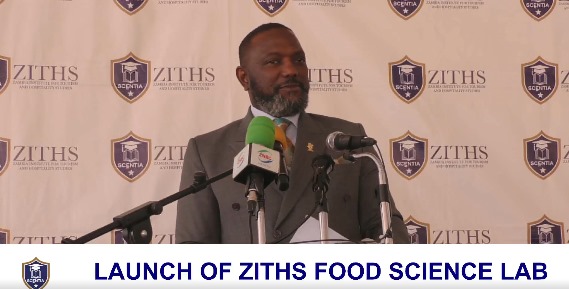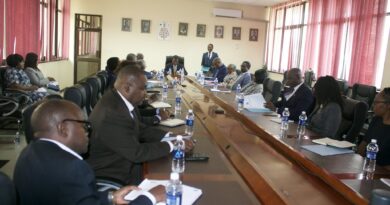ZITHS Launches Modern Food Lab to Elevate Hospitality Training
The Zambia Institute for Tourism and Hospitality Studies (ZITHS) has launched a newly rehabilitated Food Science Laboratory at its Fairview Hotel Campus, marking a major milestone in the country’s hospitality and tourism training sector.
The state-of-the-art facility is designed to enhance culinary education, improve food safety practices, and align training with global standards and evolving industry demands. Through this upgrade, ZITHS aims to produce highly skilled graduates equipped to contribute meaningfully to Zambia’s growing tourism and hospitality industry.
Speaking at the official commissioning, Tourism Minister Rodney Sikumba said the new laboratory addresses long-standing concerns over the gap between academic instruction and industry expectations in Zambia’s tourism and hospitality sectors.
“We are not just unveiling a building. We are opening opportunities,” said Sikumba. “This lab will serve as a training ground for food safety, culinary arts, and even aviation catering, ensuring our professionals are fully prepared to meet global standards.”
The state-of-the-art facility includes a training kitchen, laundry unit, and an IATA-standard aviation laboratory, all funded by the Tourism Development Fund (TDF), a mechanism financed through a 1.5% levy on accommodation services.
ZITHS Council Chairperson Mulemwa Moongwa noted that the upgrades are part of reforms implemented by the governing council, appointed in 2022, aimed at realigning the institution with market realities post-COVID.
“Findings from the 2023 Labour Force Survey revealed that while 67% of workers in the tourism sector had only up to Grade 12 education, fewer than 2% held postgraduate qualifications,” she said. “This inspired us to adopt UN Tourism Education Guidelines and push for tourism education from early childhood onwards.”
ZITHS Executive Director Anne Kaoma-Sibanda added that the lab will not only enhance hands-on training in food processing, safety, and nutrition, but also offer commercial food testing services to local hotels and food producers, an essential service that previously required outsourcing to South Africa or the U.S.
“This is not just an educational resource,” Kaoma-Sibanda explained. “It’s a national solution to a long-standing gap in food testing infrastructure.”
Minister Sikumba also emphasized the role of the new infrastructure in preserving Zambian indigenous cuisine, calling for more local dishes on restaurant, hotel, and airline menus. He urged parents to support children interested in hospitality careers, noting that the sector’s 2025 mid-year tourist arrivals reached 1.2 million, up from 1.1 million in 2024.
Sikumba also highlighted plans to launch a Tourism Satellite Account to better track the sector’s economic contribution and address misattribution of tourism revenue to other sectors like agriculture or transport.
The event also spotlighted Zambia’s growing role in the MICE (Meetings, Incentives, Conferences, and Exhibitions) industry. Frank Murangwa, Regional Director for Africa at the International Congress and Convention Association (ICCA), announced the launch of ICCA’s Meetings Lab in Zambia, the first of its kind in Africa, and the introduction of the ICCA Meetings Industry Education Programme in partnership with ZITHS.
“The global meetings sector generates over $1.1 trillion and is one of the largest job creators,” Murangwa said. “Zambia is setting a continental precedent by investing in this vital industry.”
Representing STEM Zambia, Marshal Mulunda championed home economics as a STEM-aligned discipline essential for 21st-century survival. Demonstrating the scientific foundation of hospitality, he linked kitchen operations to biology, chemistry, engineering, and mathematics, urging a rethinking of how such disciplines are taught.
“Innovation doesn’t only happen in tech hubs. It happens when science meets hospitality and creativity,” Mulunda said. He concluded with a call to turn “kitchens into classrooms and classrooms into labs of innovation”, a sentiment echoed by many in attendance.
Entrepreneur Sylvia Banda welcomed the new lab, saying its affordable testing capabilities will empower businesses promoting local foods. “This is our lab. I’ll be bringing samples next week,” she said, highlighting the potential for indigenous food entrepreneurs to scale up with proper food safety certification.



